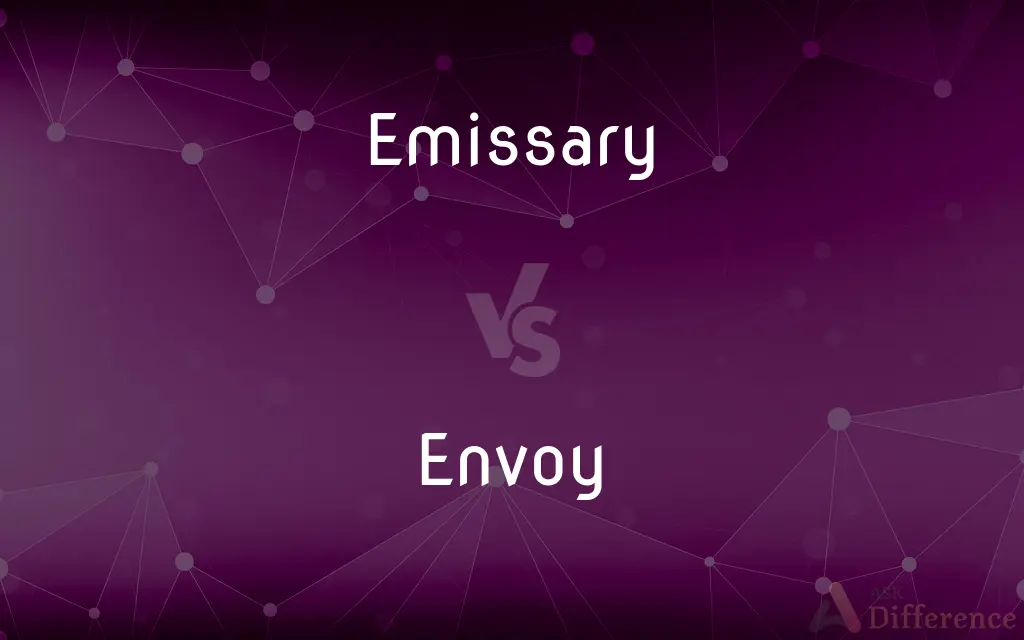Emissary vs. Envoy — What's the Difference?
Edited by Tayyaba Rehman — By Urooj Arif — Updated on March 28, 2024
An emissary is typically a representative sent on a specific mission, often secretively, while an envoy is a diplomatic agent of the highest rank, representing a government in a foreign country.

Difference Between Emissary and Envoy
Table of Contents
ADVERTISEMENT
Key Differences
An emissary is often dispatched for specific, sometimes confidential missions, focusing on discrete tasks or messages between parties. Whereas, an envoy represents their government and works openly in diplomatic relations, holding a more formal and continuous role in international affairs.
Emissaries are chosen for their ability to navigate complex situations discreetly, carrying out their tasks with a focus on secrecy and precision. On the other hand, envoys are selected for their diplomatic skills and are often involved in public ceremonies, emphasizing their visible role in fostering international relationships.
While emissaries might operate under the radar, engaging in negotiations or delivering messages without drawing public attention, envoys are recognized figures in the diplomatic community, with their activities and presence widely acknowledged and often scrutinized.
The role of an emissary can be temporary, ending with the completion of their mission. In contrast, an envoy typically serves a longer, more stable tenure, with responsibilities that cover a wide range of diplomatic functions over time.
Emissaries and envoys both play crucial roles in international relations, but their approaches differ: emissaries with their focus on specific missions and secrecy, and envoys with their broad, official capacities and public engagements.
ADVERTISEMENT
Comparison Chart
Definition
A representative sent on a specific mission, often secretly.
A diplomatic agent, often of the highest rank, representing a government.
Role Focus
Specific, sometimes confidential tasks.
Wide range of diplomatic functions.
Duration of Role
Typically temporary, until mission completion.
Longer tenure, with a stable diplomatic role.
Visibility
Operates discreetly, often under the radar.
Highly visible in diplomatic and public affairs.
Selection Criteria
Ability to navigate complex situations discreetly.
Diplomatic skills and ability to represent a government.
Compare with Definitions
Emissary
A secret agent sent on a special mission.
The king sent an emissary to negotiate the release of the prisoners.
Envoy
A diplomatic representative of a country.
The envoy presented her credentials to the foreign ministry.
Emissary
An individual dispatched for diplomatic or secretive tasks.
An emissary was sent to gather intelligence about the upcoming treaty.
Envoy
A government official stationed in a foreign country.
The envoy attended the national day celebration at the embassy.
Emissary
A messenger carrying urgent or confidential news.
The general received a late-night visit from an emissary bearing crucial information.
Envoy
An ambassador or representative in international dealings.
The envoy worked tirelessly to strengthen ties between the two nations.
Emissary
A representative tasked with a specific objective.
The company's emissary to the trade discussions was well-prepared.
Envoy
A high-ranking diplomat sent by a government to represent it.
The president’s envoy to the peace talks played a key role.
Emissary
A delegate on a mission of peace or negotiation.
An emissary arrived to mediate the dispute between the neighboring states.
Envoy
A messenger or representative with a specific diplomatic mission.
The envoy carried the proposal for the new trade agreement.
Emissary
An agent sent on a mission to represent or advance the interests of another.
Envoy
A representative of a government who is sent on a special diplomatic mission.
Emissary
An agent sent on a mission to represent the interests of someone else.
Envoy
A minister plenipotentiary assigned to a foreign embassy, ranking next below the ambassador.
Emissary
(anatomy) A venous channel in the skull.
Envoy
A messenger; an agent.
Emissary
An underground channel by which the water of a lake escapes.
Envoy
A short closing stanza in certain verse forms, such as the ballade or sestina, dedicating the poem to a patron or summarizing its main ideas.
Emissary
An agent employed to advance, in a covert manner, the interests of his employers; one sent out by any power that is at war with another, to create dissatisfaction among the people of the latter.
Buzzing emissaries fill the earsOf listening crowds with jealousies and fears.
Envoy
The concluding portion of a prose work or a play.
Emissary
Exploring; spying.
Envoy
(law) A diplomatic agent of the second rank, next in status after an ambassador.
Emissary
Applied to the veins which pass out of the cranium through apertures in its walls.
Envoy
A representative.
Special envoy to the United Nations
Emissary
Someone sent on a mission to represent the interests of someone else
Envoy
A diplomat.
Envoy
A messenger.
Envoy
(poetry) short stanza at end of poem
Envoy
One dispatched upon an errand or mission; a messenger; esp., a person deputed by a sovereign or a government to negotiate a treaty, or transact other business, with a foreign sovereign or government; a minister accredited to a foreign government. An envoy's rank is below that of an ambassador.
Envoy
An explanatory or commendatory postscript to a poem, essay, or book; - also in the French from, l'envoi.
The envoy of a ballad is the "sending" of it forth.
Envoy
A diplomat having less authority than an ambassador
Envoy
Someone sent on a mission to represent the interests of someone else
Envoy
A brief stanza concluding certain forms of poetry
Common Curiosities
Can an emissary be considered a diplomat?
Yes, but they are often more focused on specific tasks than general diplomacy.
What is an emissary?
An emissary is a representative sent on a specific, often secret mission.
Can an envoy engage in secret missions?
While envoys primarily work in official capacities, they may engage in confidential aspects of diplomacy.
How long does an emissary serve?
Their service is usually temporary, ending with their mission’s completion.
Who can appoint an envoy?
Envoys are typically appointed by the head of state or government of their country.
What skills are important for an emissary?
Discretion, negotiation, and the ability to navigate complex situations are crucial.
How are emissaries chosen?
Based on their expertise in specific areas and ability to complete missions discreetly.
What does an envoy do?
An envoy represents their government in a foreign country, handling diplomatic relations.
How do emissaries and envoys differ in their roles?
Emissaries focus on specific missions, often secretly, while envoys handle a wide range of diplomatic activities openly.
Is an envoy always a high-ranking official?
Typically, yes, envoys are high-ranking diplomats representing their government.
What is the main purpose of an envoy?
To represent their government and manage diplomatic relations in a foreign country.
Do emissaries have official diplomatic status?
Not always, as their missions can be secretive and not always involve formal diplomatic engagement.
What qualifications are needed to become an envoy?
Diplomatic skills, extensive knowledge of international relations, and often prior government or diplomatic service.
What distinguishes an emissary's mission from an envoy's duties?
Emissaries are focused on specific, often secret missions, whereas envoys have broader, ongoing diplomatic responsibilities.
Are emissaries part of the diplomatic corps?
They may not formally belong to the diplomatic corps but serve on specific missions that require diplomacy.
Share Your Discovery

Previous Comparison
Drink vs. Imbibe
Next Comparison
Perceptive vs. IntuitiveAuthor Spotlight
Written by
Urooj ArifUrooj is a skilled content writer at Ask Difference, known for her exceptional ability to simplify complex topics into engaging and informative content. With a passion for research and a flair for clear, concise writing, she consistently delivers articles that resonate with our diverse audience.
Edited by
Tayyaba RehmanTayyaba Rehman is a distinguished writer, currently serving as a primary contributor to askdifference.com. As a researcher in semantics and etymology, Tayyaba's passion for the complexity of languages and their distinctions has found a perfect home on the platform. Tayyaba delves into the intricacies of language, distinguishing between commonly confused words and phrases, thereby providing clarity for readers worldwide.















































